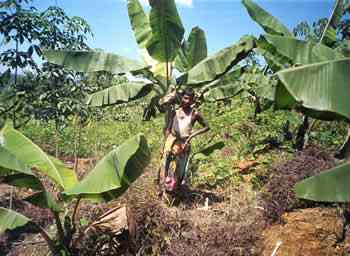PSP RESEARCH OVERVIEW - AGRONOMY
Adoption of new agronomic practices has always been dependent on the level of farmers' resources because agronomic interventions are often capital- and knowledge-intensive. PSP agronomy research is mindful that interventions must be simple but effective to make adoption by farmers more likely.
Intercropping:
 PSP-funded
research has addressed a major problem faced by smallholder rubber farmers,
namely the 6-7 year gap in income suffered after replanting of rubber. Many
farmers try to bridge this gap in income by intercropping the young rubber
trees with shorter duration subsistence cash crops, such as banana (see right).
Our research has shown that intercropping rubber, even at high intercrop densities,
can have major benefits in terms of both income generation from the land and
enhanced growth and latex yield of rubber.
PSP-funded
research has addressed a major problem faced by smallholder rubber farmers,
namely the 6-7 year gap in income suffered after replanting of rubber. Many
farmers try to bridge this gap in income by intercropping the young rubber
trees with shorter duration subsistence cash crops, such as banana (see right).
Our research has shown that intercropping rubber, even at high intercrop densities,
can have major benefits in terms of both income generation from the land and
enhanced growth and latex yield of rubber.
Maize is a staple for around 10 million people in the mid-hills of Nepal, where most families are in food deficit because maize yields are low. Maize is often relayed cropped with millet on crop terraces that are oftren affected by the presence of fodder trees. Although new varieties previously released have had higher yield potential than local cultivars, they have not been adopted by hill farmers because they were not compatible with the farming system. This project achieved a 30% yield increase over local varieties by introducing high yielding germplasm from CIMMYT, modified on-station in relation to farmers' preferences and then tested for local suitability by farmers themselves.
Visit the PSP project database and virtual library for further details of the above and other projects.
PSP AT A GLANCE
Website Constructed and Maintained by C.M. Stirling.